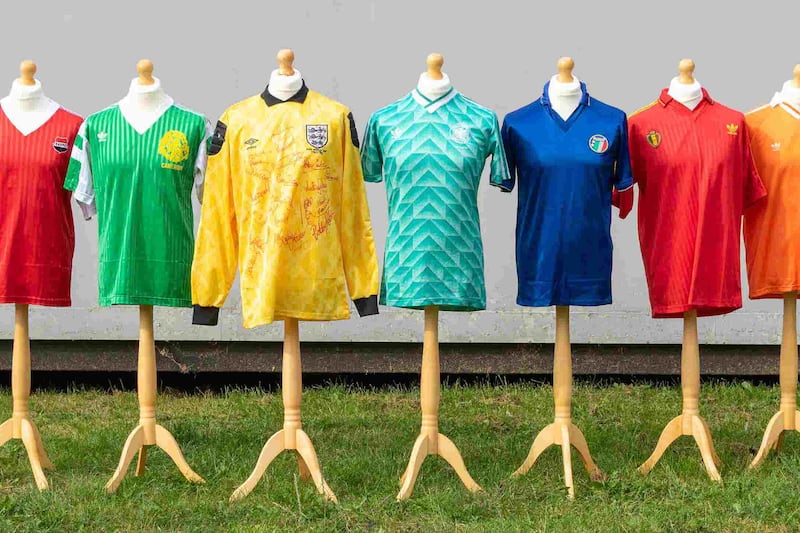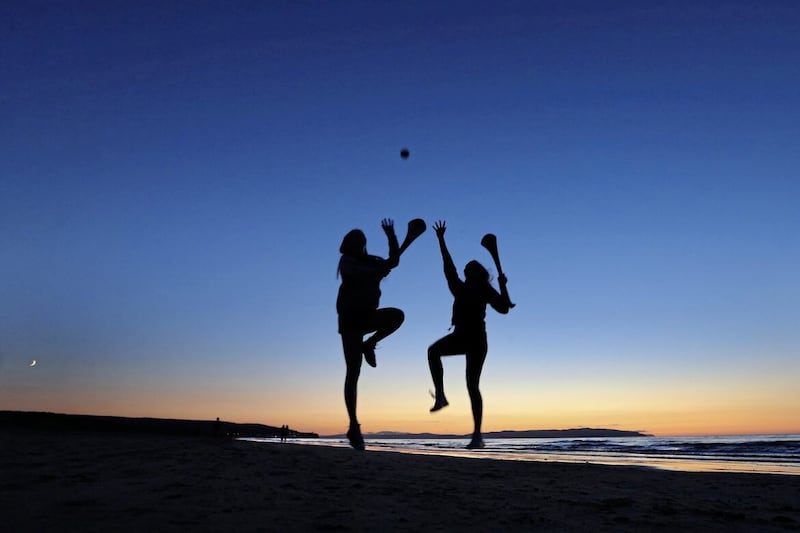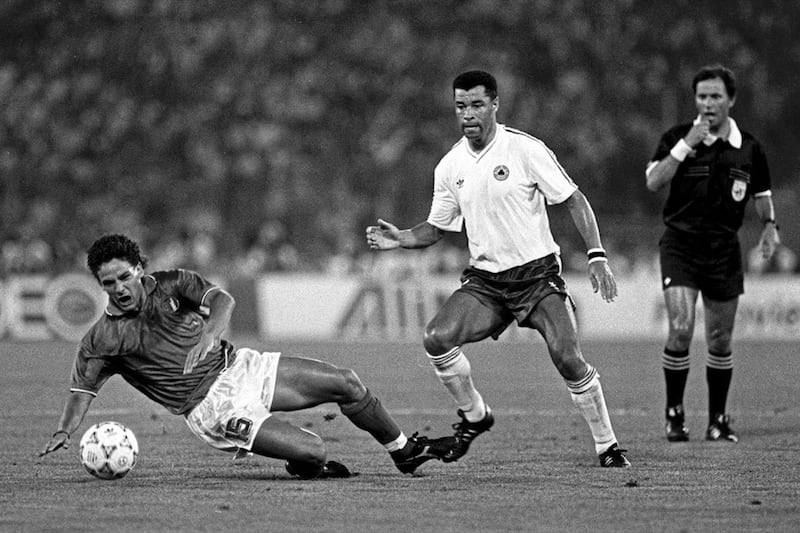SATURDAY June 30, 1990. A balmy night in Rome. The Republic of Ireland players couldn’t have been more relaxed facing into their first-ever World Cup quarter-final against illustrious hosts Italy.
As fans started to stream into the famous Olympic Stadium, the Irish players were lying around the centre circle of the pitch watching on the big screen the conclusion of Argentina’s penalty shoot-out with Yugoslavia in their quarter-final up in Florence.
“I remember us being unbelievably relaxed before the Italy game,” says Mick McCarthy.
“As ever, we travelled very casually, wearing shorts, flip-flops and t-shirts. We came into the stadium and Argentina were playing that day and it was on both the big screens at either end of the stadium, and we were laid out on the pitch when the Italian players came in.
“They were wearing their Kappa gear, looking immaculate, slicked back hair, sun-glasses, good-looking as well.
“I think they were really surprised and shocked when they saw us in the middle of the pitch lying back on the pitch watching the game on the screen.”
McCarthy adds: “There was far more tension about them.”
Jack Charlton’s men were a liberated force after their nail-biting penalty shoot-out win over Romania in Genoa five days earlier.
In unchartered territory, the Irish players were completely unfazed at the prospect of facing the Azzurri and tournament favourites in their own backyard.
It wasn’t like that a couple of weeks earlier though.
A tense mood had enveloped the Irish camp during the group stages that saw them play in Cagliari and Palermo. Three dour struggles - against England (1-1), Egypt (0-0) and Holland (1-1) – yielded three points but enough to see them reach the knock-out stages of Italia 90.
Two years earlier there was no pressure on the Irish at Euro '88, but expectations had risen considerably since that virginal voyage to West Germany.
“Euro 88 was brilliant,” McCarthy says, “because it was brand new and we’d never done it before. Nobody expected us to do anything and we played really well. I would say the build-up to ’88 and the start of the competition was more enjoyable than ’90.
“I remember the build-up to our first game at the World Cup, against England, and Jack feeling under pressure. There was a different feel to our build-up at the World Cup, there was expectation, so it was a bit more intense. It turned out the England game was great, the Egypt game was crap – and we got grief for that for which we deserved – and then the Holland game was brilliant as well.”
***********
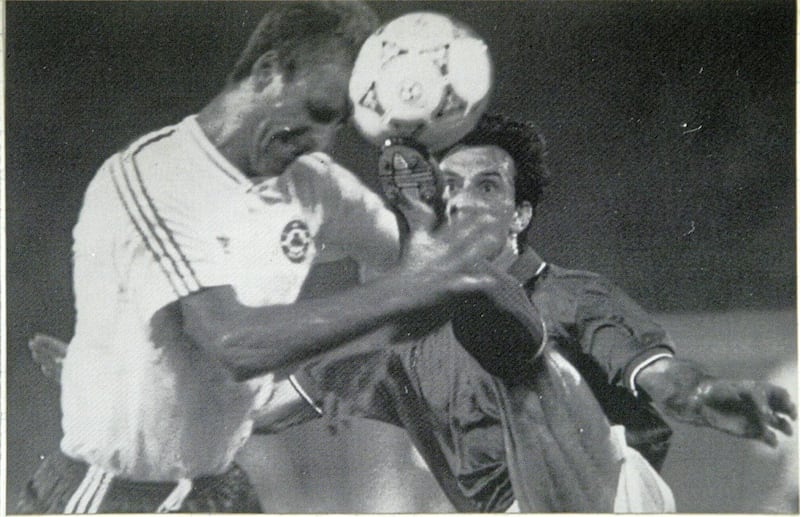
MICK McCarthy and Ray Houghton almost never made it to the World Cup finals 30 years ago. Still a vital cog in Liverpool’s midfield, Houghton was dogged by injuries in the season leading into Italia ’90.
“It was a funny tournament for me,” recalls Ireland’s livewire midfielder, “because I was injured coming into it as was Kevin Moran and Ronnie Whelan. We had to sit down with Jack and he said: ‘Listen, I need to know if you’re going to make it.’
“We had to be as honest as we could. That was a slight concern going into it, it’s never nice going into a tournament like that when you didn’t feel 100 per cent.”
Houghton, Moran and Whelan all made the 22-man squad bound for Italy, although Whelan was the one who struggled most with his fitness during the finals, making just one substitute appearance (against Holland).
McCarthy, meanwhile, had left Celtic at the end of the 1988-89 season and rolled the dice by signing for French club Lyon in World Cup year. Injury blighted his time in France and when he did return to fitness he couldn’t get back into the Lyon team.
With the World Cup finals fast approaching, McCarthy secured a loan move to Millwall.
“I played 10 games for Millwall in the First Division towards the end of that season,” says McCarthy, who captained the team in Italy.
“I came back to play in a World Cup because I wouldn’t have played otherwise.
“Remi Garde and Bruno nGotty were in the Lyon team. I was injured but I wasn’t stupid. I knew I wasn’t getting back in the team the way they were playing, so I came back to Millwall and had the games I had and went to the World Cup.”
The Republic were never a free-flowing, goal-scoring outfit. They’d mined just two goals in four games in reaching the quarter-final stages.
There was infinitely more pizzazz surrounding the Italian national team. Serie A, after all, was still the exciting hub of European football where the best players in the world flocked.
In 1990, Walter Zenga of Inter Milan was regarded as one of the best goalkeepers around. Franco Baresi and Paolo Maldini were already greats of the game and their AC Milan team-mate and wide player Roberto Donadoni, still only 27, was at the peak of his powers.
Up to that point, Italy had played all their games in Rome’s fabulous Olympic Stadium and were entirely dominant in the group stages against Austria (1-0), USA (1-0) and Czechoslovakia (2-0), but they were far from prolific scorers themselves.
Although they hadn’t conceded a goal in reaching the last eight, Azeglio Vicini was still trying to come up with the right formula in the Azzurri attack.
Vicini started the tournament with Sampdoria’s Gianluca Vialli and Napoli’s Andrea Carnavale of Napoli up front but before the group stages had concluded, Roberto Baggio and ‘Toto’ Schillaci were the chosen two.
Baggio was one of the shining stars of Italian football producing endless brilliance at Fiorentina, which earned him a big-money move to Juventus after the World Cup where he would team up with Schillaci again – a £3.5m signing from little-known Messina at the start of the 1989-90 season.
It took the Italians a while to break down the defensive-minded Uruguayans in their last 16 clash before second-half goals from Schillaci and substitute Aldo Serena settled the home supporters' nerves.
While Vicini was chopping and changing his line-up, Charlton had an altogether more settled unit.
After the scoreless draw against Egypt in the group stages, Niall Quinn replaced Tony Cascarino in attack, which proved the only tweak Charlton made in five games.
“If you went through our team, they all had success, they had that winning knowledge,” notes Houghton.
“We had players who had experience of winning – and that kept us in good stead. We knew what Jack wanted too. We didn’t score a lot of goals but we didn’t concede that many either. We knew each other’s job, we worked hard for each other – when you looked across the park you had Moran, McCarthy, McGrath, and you always knew: ‘We’re going to be alright here today.’”
“You talk about attacking full-backs now,” McCarthy says. “That was there back then. Chris Morris was fabulous going forward, so was ‘Stan’ [Steve Staunton] who was one of the best full-backs around.
“Mind you, they had Maldini who was only 19 at the time and [Franco] Baresi was one of the best of all-time. They had Donadoni too. They were a fabulous team.
“We were probably the oldest team in the competition, certainly one of them. At that stage I was 31, Kevin Moran was older than me… we were a very experienced team but we also believed in ourselves.
“Going into the Italy game, there was no fear from us - none whatsoever. We had respect for them, we were aware of their qualities.
“It was a great occasion to be part of – that’s what we thought about it. We had a few beers after we beat Romania, we had a great night in Rapallo and the day after we knuckled down and started getting ready for it. We were never concerned about it and I think you could see that in our approach.”
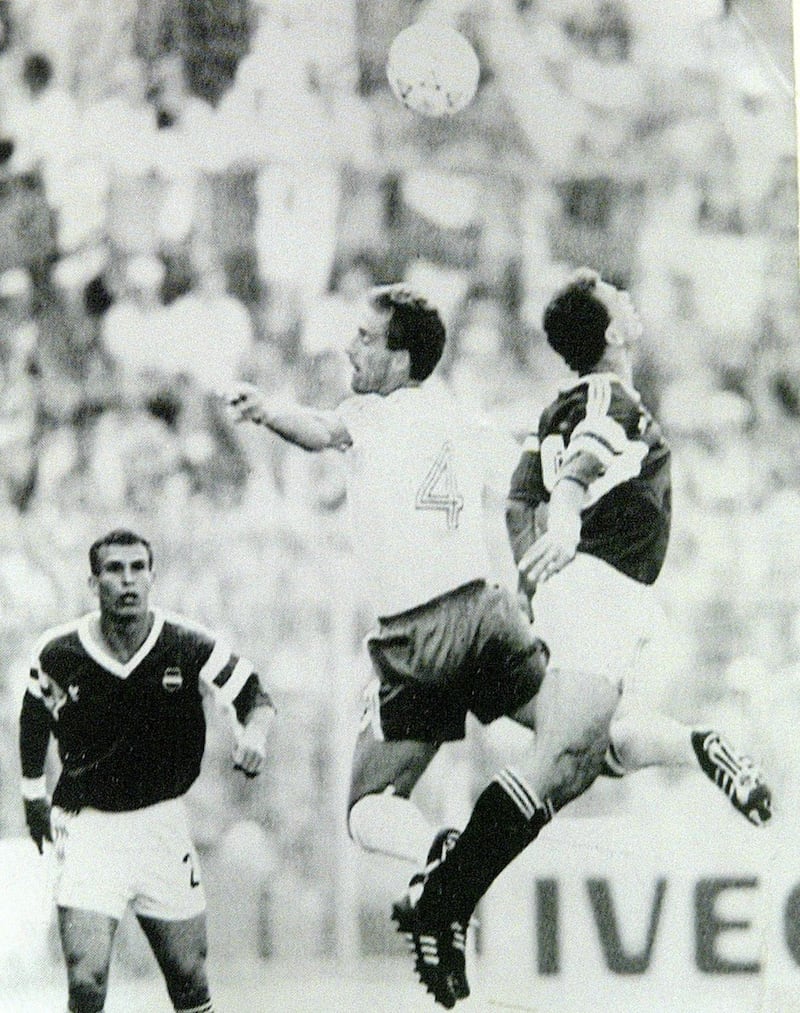
***********
IRELAND’S easy-going demeanour was typified by Kevin Moran and John Aldridge sharing a joke as the two sets of players made their way out onto the pitch.
Whether it was by design or not, ‘Amhrán na bhFiann’ was played at a deathly pace by the white-suited brass band - but when it came to the home nation’s ‘Il Canto degli Italiani, theirs was played with feeling and verve that raised the roof of the Olympic Stadium.
Nevertheless, the Republic started the quarter-final better than any of their four previous games in the tournament, knitting a series of passes together and making light of the fact that they had played extra-time in Genoa five days earlier and had one day’s less rest than the Italians.
Typically, they harried Italy’s defenders out of their stride and even the great Franco Baresi coughed up possession three times in quick succession in the early exchanges.
Around the 20th minute mark, Paul McGrath broke down the right flank and clipped a brilliant cross into the danger zone that saw Niall Quinn tower above Ricardo Ferri, but Zenga saved well.
Irish tails were up.
Houghton recalls: “Going into the Italy game, we thought if we could keep it tight we could try and turn the crowd a little bit and they might start to panic. But in the first half I thought they were pretty decent. We had that one chance in the first half when Niall Quinn had that header...
But any time Baggio and Schillaci gained possession, they looked dangerous or won free-kicks for their team.
McCarthy had marked Gary Lineker and Marco van Basten in the group stages of Italia 90 – but Schillaci was arguably his greatest challenge.
“I was 31 at the time and I’d learnt a lot by then,” he says.
“Schillaci was a nasty little sod as well, he’d leave his foot in, he was a tough little guy. At one point he gave me the knife-across-the-throat bit and all that. I did clip him on the eye. But he was up for it. He was no shrinking violet.
“It wasn’t me bullying him around, I was looking after myself as much as anything. Although, in saying that, I tended to retaliate first to be honest.
“The Italians all know how to look after themselves. They were masters of the dark arts – picking you up and nipping your armpit and all that caper. It was a real competitive game.
“But I just remember Schillaci’s movement was brilliant. He would drag you out and run in behind. He was having a purple patch for them in that World Cup, he was a good player.”
*************
36th minute...
KEVIN Sheedy gained possession on the left side. Staunton charged down the left side to give Sheedy an option but instead he slipped the ball into John Aldridge’s feet. Fernando De Napoli, a tigerish midfielder, dispossessed Aldridge and Italy raced into a dangerous counter-attack....
‘Townsend getting a challenge in… Baggio to Schillaci… Giannani looks for Donadoni (shoots)…good parry… Schillaccccccccciiiiiii… Schillaci has scored again…’ RTE commentator Jimmy Magee
*************
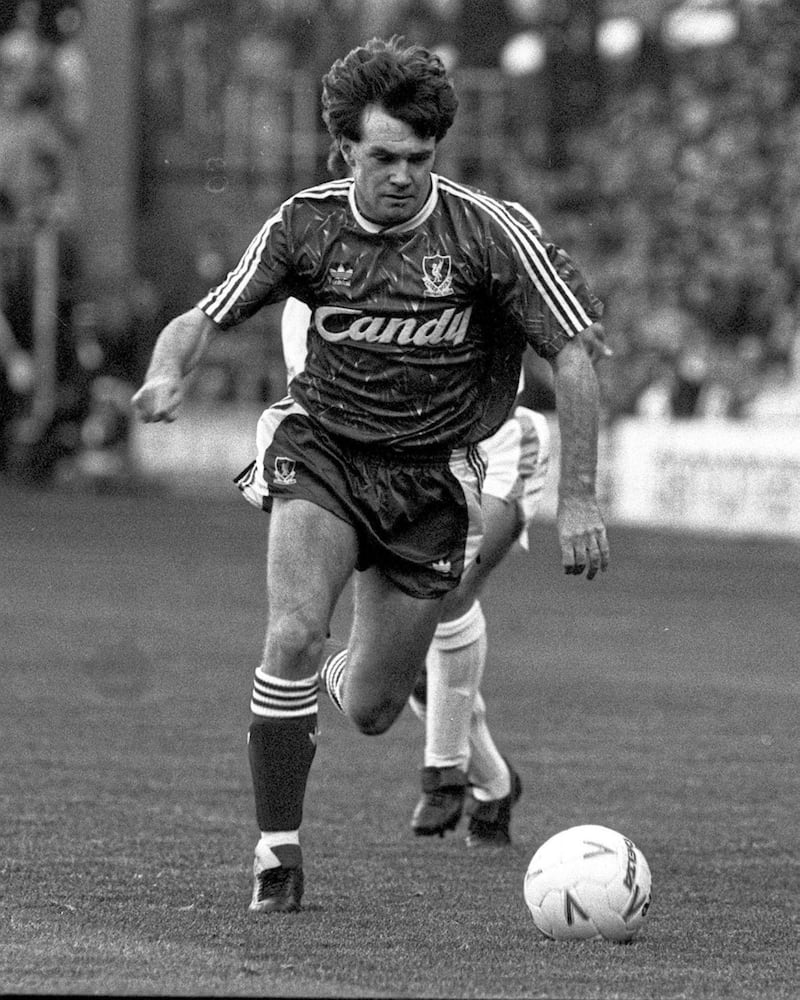
“I JUST remember Donadoni’s shot and Packie saving it and he looked like he was well out of his goal, but Schillaci reacted unbelievably well,” says Houghton.
“He was just in superb form. He started the tournament on the bench and he obviously did well in a few games… He was pivotal to Italy.
“I do think we had a couple of decent passages of play but I remember the referee didn’t give us anything. I thought we should have had a few free-kicks around their box and he didn’t give us anything.”
Most neutrals would agree that Portuguese referee Carlos Silva Valente was too quick to blow for Irish infringements and when he did award the visitors a free-kick Kevin Moran offered sarcastic applause in the official’s direction, and received a yellow card for his troubles.
“I remember the referee being very, very pedantic,” McCarthy says. “He gave Italy loads and loads of fouls.”
The Republic battled gamely in the second half, and while they had a couple of good situations around Italy’s penalty box, Zenga didn’t have to make another meaningful save.
Indeed, Schillaci thundered Packie Bonner’s crossbar with a pile-driver of a free-kick as the Italians squeezed into the World Cup semi-finals, courtesy of the front man’s 36th minute strike.
“Italy were a very good side, a well-disciplined team,” Houghton adds. “But I didn’t think they were favourites after they beat us. They had as good a chance as West Germany, as England, as Argentina. And, of course, they were playing against Maradona in the semi-finals too.”
***********
ROME proved the end of the road for the Irish. They missed out on qualifying for Euro 92 but returned to the World Cup stage again in USA ’94.
After 57 caps, Mick McCarthy called it a day in 1992. Houghton was still around in ’94 to avenge that Italy defeat in the Giants Stadium before he ended his international career in ’97.
“If you look at where all our players were playing at that time – apart from me, as I’d signed for Millwall from Lyon – but they were all playing for top clubs at the time.
“At one point there were only four clubs represented: Celtic, Man United, Tottenham and Liverpool. We had a bloody good team, a proper team of good, intelligent footballers, hard workers, no moaners, all got on with it. But some real talented players.
“I mean, Paul McGrath got voted onto the World Cup team and he was a centre half playing midfield. We were hard to play against. Jack gave us the system we had to play and we all played it and it bloody worked.”
If the homecoming in Dublin in ’88 was special, Italia ’90 was off the scale.
“In 88, we didn’t know what was happening,” laughs Houghton.
“If you ever seen those scenes you can actually see some of our boys coming off the plane in ’88 with Aer Lingus t-shirts on because we were messing about on the plane.
“By 1990, we had a better idea of what was going on. The reception we got was just amazing. In ’94, a few of the lads didn’t really want to go back because they didn’t feel they’d done well enough.”
Thirty years ago today, on a hot Saturday afternoon, the entire nation was counting down the minutes to 8pm, hoping and praying the World Cup dream would extend to the semi-finals.
“They were the best times of our careers and the happiest times of our careers,” McCarthy says now.
“It was the best time in my life. It was wonderful.”
The teams...
1990 World Cup quarter-final: Italy 1 Republic of Ireland 0
Venue: Stadio Olimpico, Rome Date: June 30 1990 Attendance: 73,303
Republic of Ireland: Packie Bonner, Chris Morris, Steve Staunton, Mick McCarthy, Kevin Moran, Paul McGrath, Ray Houghton, Kevin Sheedy, Andy Townsend, John Aldridge (John Sheridan 78'), Niall Quinn (Tony Cascarino 54')
Italy: Walter Zenga, Franco Baresi, Giuseppe Bergomi, Luigi De Agostini, Riccardo Ferri, Paolo Maldini, Fernando De Napoli, Giuseppe Giannini (-64), Roberto Donadoni, Roberto Baggio (-72), Salvatore Schillaci
Referee: Carlos Silva Valente (Portugal)




